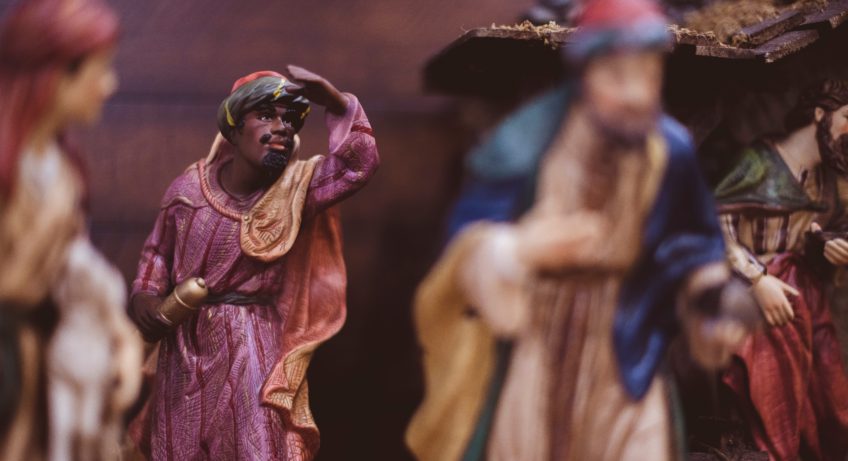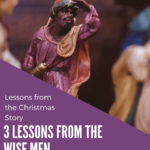This week, as I’ve been thinking about the Christmas story, I’ve been thinking a lot about the Magi or the Wise Men that are mentioned in Matthew 2:1-12. The Magi are interesting characters. We aren’t told nearly enough about them in my humble opinion(though I suppose God has told us everything we need to know about them). We don’t know exactly where they were from. The Bible just tells us that they were “from the east.” They were probably from an Arabian country, but they could have been from farther away.
Who Were the Wise Men?
They’re called Magi or Wise Men. These are the same types of people that appear in the book of Daniel. Daniel is actually considered one of them. They were learned and wealthy men. These men may have worked for a king. They may have been astrologers, studying the starts to determine the future. They may have been diviners, interpreting dreams and visions. No matter what they did specifically to earn the title “Magi” or “Wise Men,” they weren’t the type of people the Jews would have expected to be told about the Messiah.
There were no Magi or Wise Men of this type in Israel. The profession had pagan/other religious origins. Jews would probably have looked down upon them. Sorcerers and diviners were ordered to be stoned in the Old Testament. Despite their wealth and prestige, these men would not have been expected to play a part in the story of the Messiah’s coming.
Lesson 1: The Gospel is for All People Everywhere
Despite that, they are an important part of the Christmas story. They’re one of the first clues in the gospel story that the good news of Jesus isn’t just for the Jewish people. It’s for everyone, regardless of where they come from.
Today, it can be easy for us to think of the gospel as for everyone. We don’t have difficulty thinking that the gospel can reach people in other nations or people from other religions, at least intellectually. However, it can be hard for us to let that truth sink into our hearts. There are people that we tend to write off. We can’t see how God could ever be a part of that person’s life.
These people come in all shapes in sizes. It’s the brother we think is past hope. The friend we can’t see ever being interested in anything remotely spiritual. The person whose life seems so opposed to God, you don’t believe they could ever meet Jesus.
Lesson 2: God Meets You Where You’re At
We should also note from this story that God uses unusual methods to speak to the wise men. Nowhere else in the Bible do prophets or other Jewish sages consult the stars. That was a common practice in other religions and traditions, but not in Judaism. In this story, God meets the wise men where they are. They must study the stars, whether that’s for scientific or future telling purposes, in order to notice this new star.
Unlike how its portrayed in many Christmas books, the star wasn’t necessarily so big or bold that anyone else noticed it. There isn’t any evidence in the Bible that anyone other than the wise men noticed this unusual star. It may have just been a normal looking star, only remarkable to those that studied the night skies in depth. God uses signs and methods that are unique to the people he’s trying to speak to.
The Wise Men teach us that God reveals himself to the people you might least expect. He does that in ways that are unique. Whether it’s a star, a song, or a sermon, God can speak to people in ways that can only be understood by the person he’s speaking to
Lesson #3: You Don’t Have to Know What You’re Doing to Follow God
There’s another lesson that the wise men can teach us: God rewards those who seek him, even if they’re not 100% sure what they’re seeking. The wise men knew from the star they saw that the king they were seeking would change the world. They didn’t necessarily know what country he was from when they started their quest. We don’t know if they knew anything about the Jewish religion or the promised Messiah.
The wise men are like Mary (as we looked at in last week’s post), they did what God placed before them to do, despite the fact they didn’t have all the answers. The wise men saw the star and they followed it. They knew it meant great things, even if they weren’t exactly sure what those great things were.
God asks us to do the same. When we receive a sign or a word from him that we’re supposed to go somewhere or do something, we should do it, whether or not we totally understand what we’re being asked to do.
Don’t be afraid to move forward, even if you feel like you don’t know what you’re doing or how it will turn out. You never know what God can do with a willing heart and feet that are eager to do his business.
So there you have it, three lessons, one for each of the wise men (though actually we don’t know how many wise men there were, we just guess three because there were three gifts). Have you learned anything else from the wise men? Feel free to share it below.


[…] If you haven’t already make sure to check out last week’s post and the post before that, which are the first two posts in this series. Also, make sure to follow […]